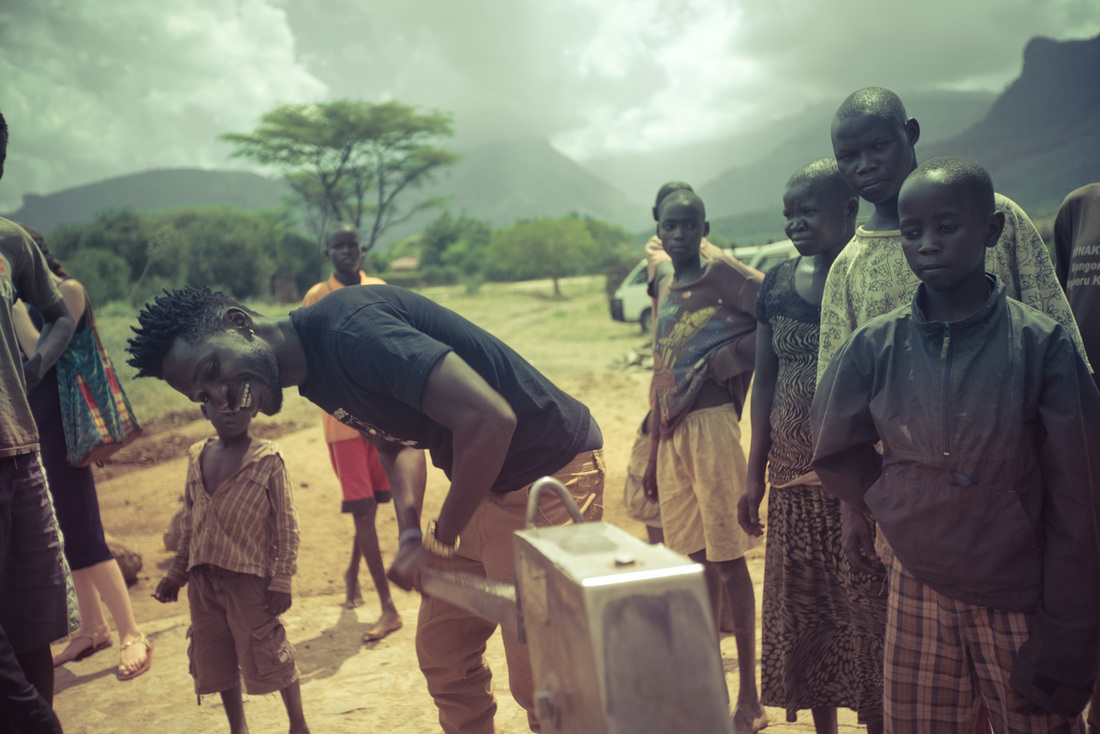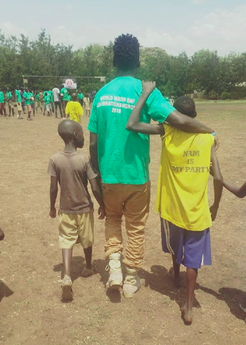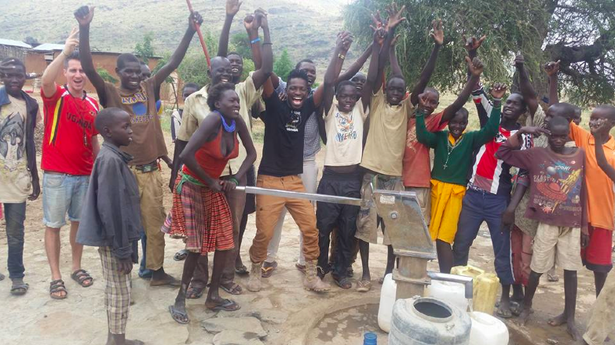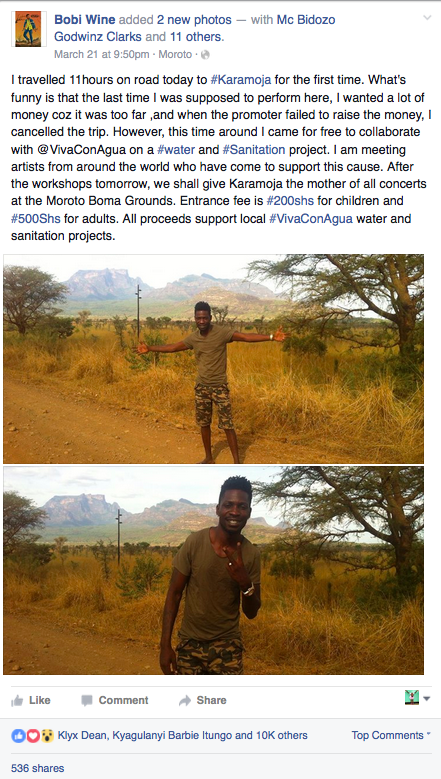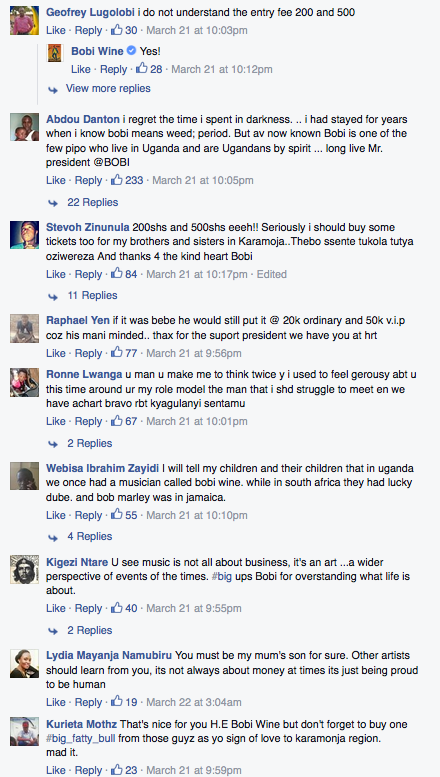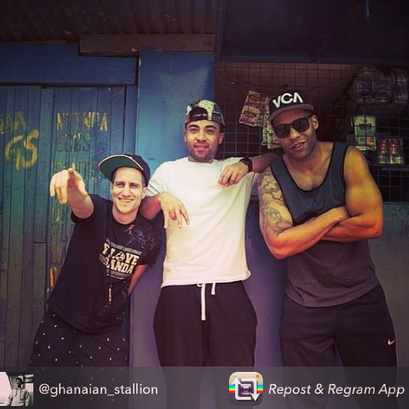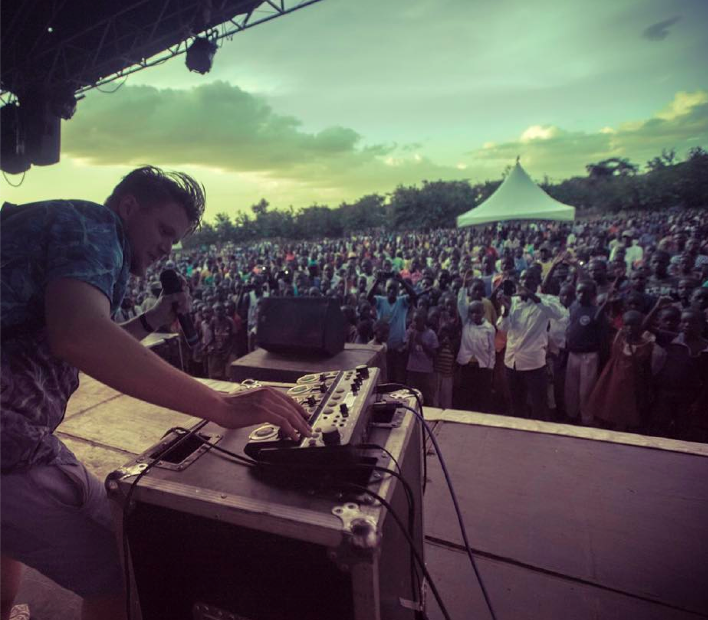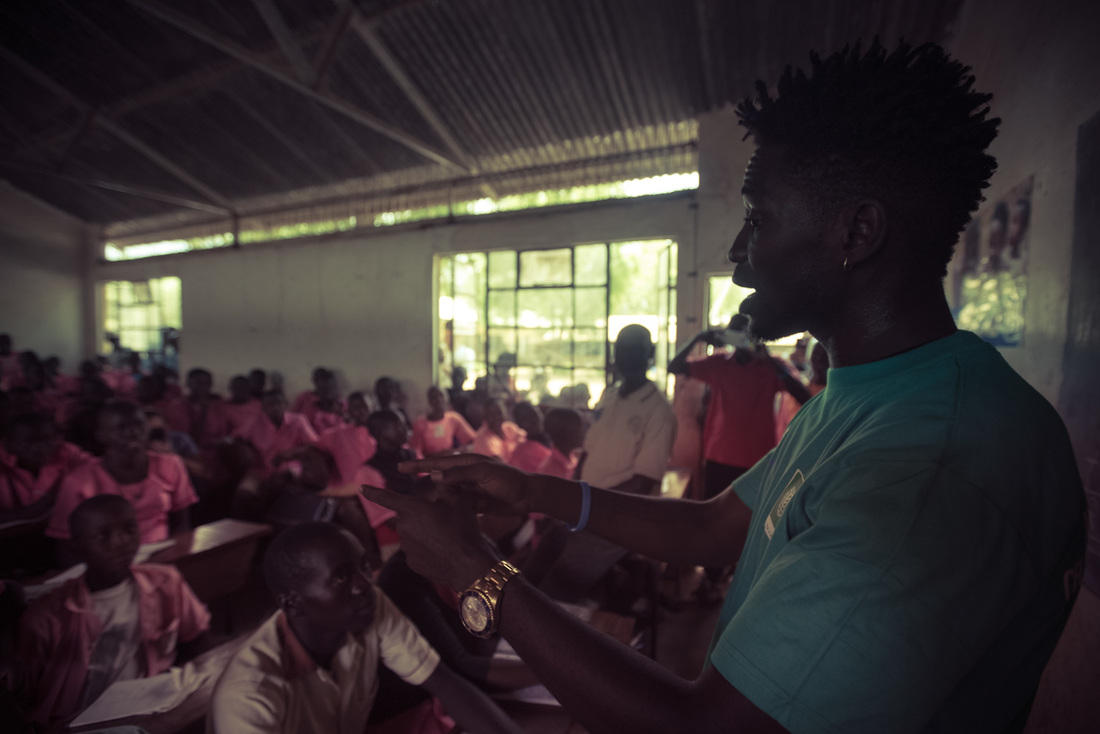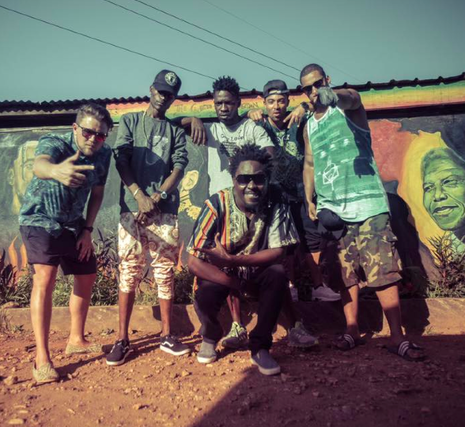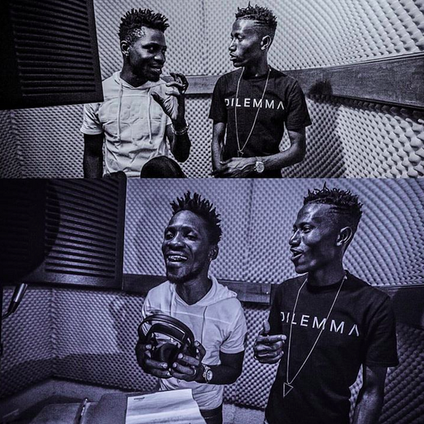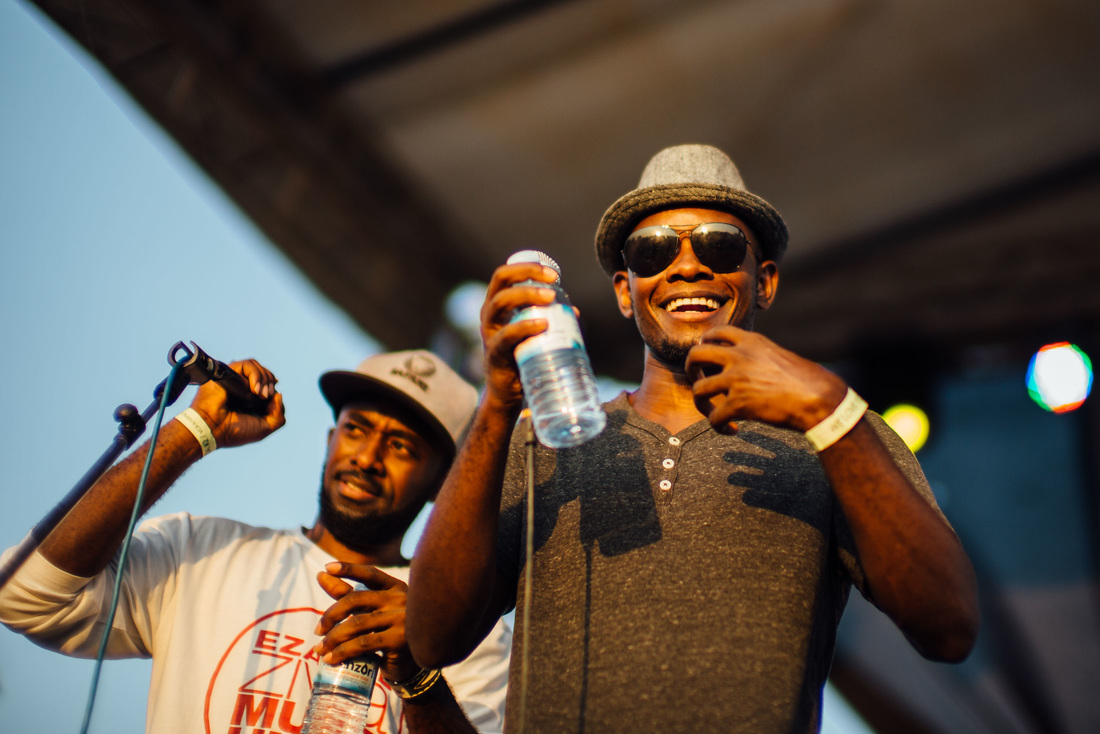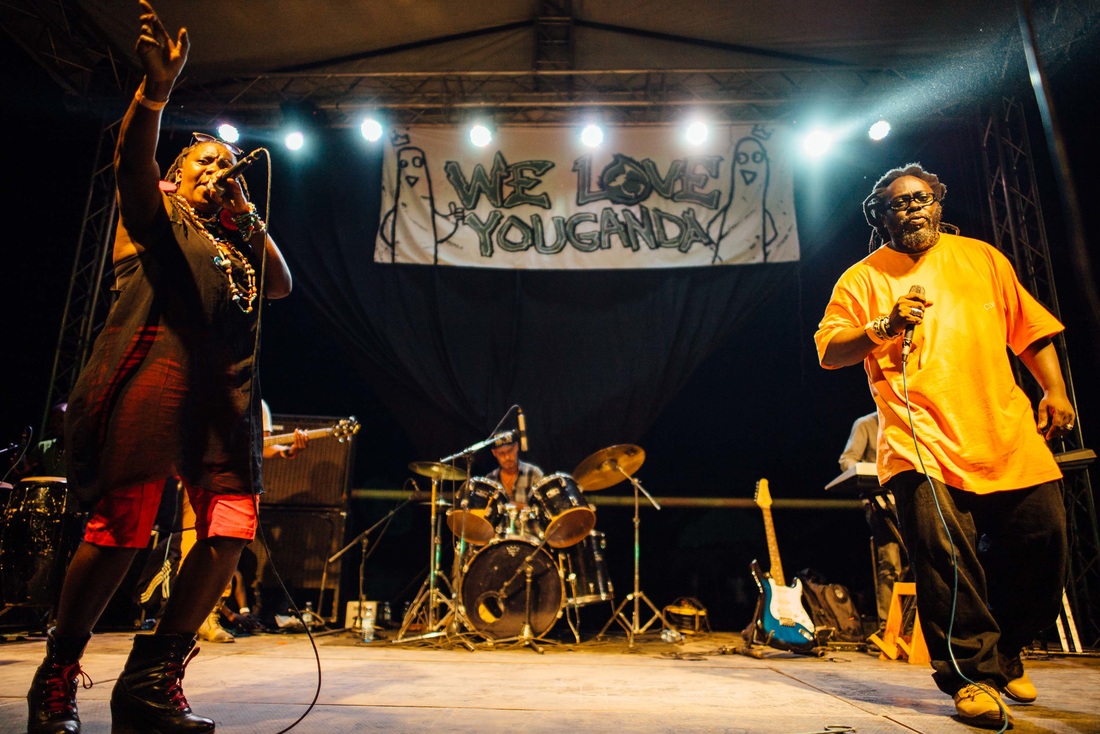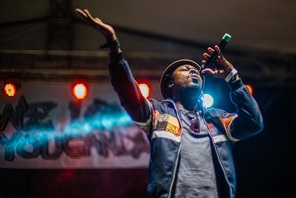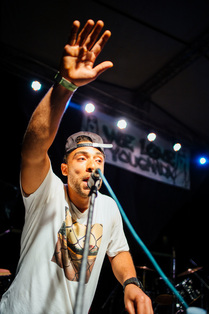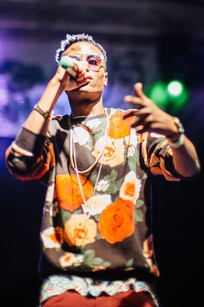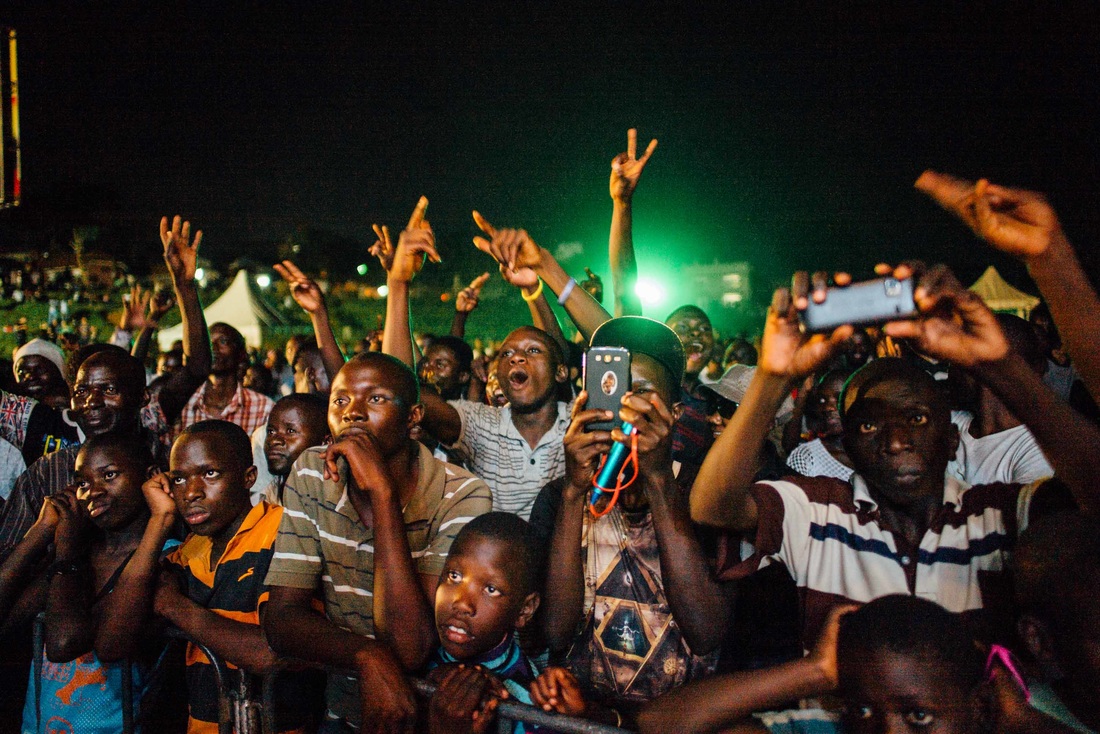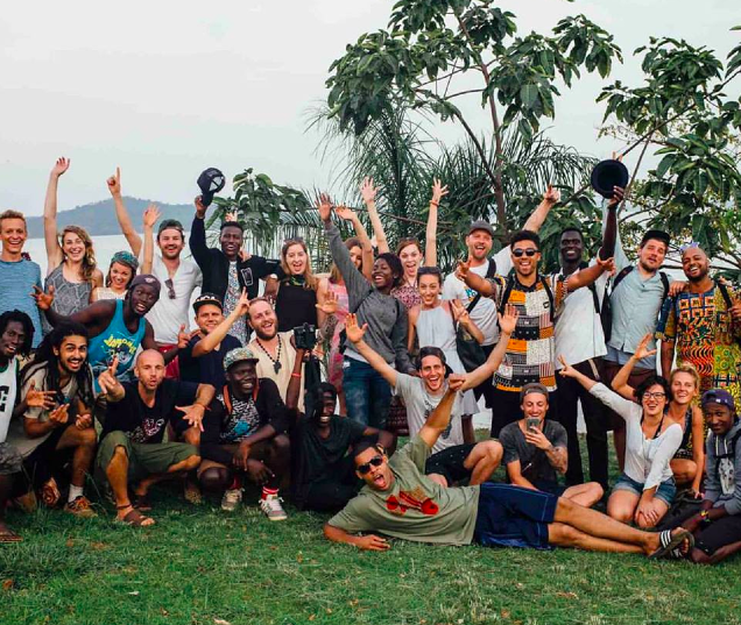Artists from around the world came together with Viva con Agua this past week to support Viva con Agua water and sanitation projects in Moroto, Karamoja, through an artistic exchange and music collaboration. The project included project visits, workshops and performances in Moroto and Kampala, as well as the recording of a collabo between top artists from four countries (Uganda, Kenya, Switzerland, Germany).
On March 22, World Water Day, a group of local and international artists – both musical and visual – travelled with the Viva con Agua team from Kampala and some Viva con Agua colleagues invited from Europe to Moroto, Karamoja. The group visited pit latrines and water facilities that had been built by the local partners of Viva con Agua, and they met with the Karamojong community to learn about how to make the water and sanitation projects sustainable. That night, Viva con Agua Kampala with the support of Viva con Agua Germany put up a fundraising and awareness concert for the Moroto community, charging 500shs for adults and 200shs for children. Through these efforts, Viva con Agua Kampala can support own water and sanitation projects. Representing Uganda was Bobi Wine and Maro, who shared their experiences on their social media pages.
“We had a very long journey and went directly to Moroto, and this was kind of a crazy experience,” described Knackeboul. “Coming from Switzerland to Karamoja, it was like beaming in. It was very impressive: beautiful country, lovely people.”
“It is a blessing for me to be in Uganda,” said Megaloh. “I felt more at home in this one week than I felt in all my life in Germany. I’m very grateful and proud to be part of this.”
“It is a blessing for me to be in Uganda,” said Megaloh. “I felt more at home in this one week than I felt in all my life in Germany. I’m very grateful and proud to be part of this.”
“I’m always critical with NGOs,” Knackeboul continued, “and I’m not always sure how much they connect, but what I saw with this group is there’s not only the support with water and sanitation, but also this cultural exchange. We go to Kampala and exchange with the artists from here that are on a similar level when it comes to arts and music. It’s not only like “here are the cool artists from Switzerland that we show to poor people; it’s like, we learn from them and they learn from us.”
In Moroto, Bobi Wine spoke of the importance of Ugandans taking responsibility for their own wellbeing at the Moroto Municipal Primary School.
“I want you to remember,” said Bobi Wine, “that as much as we have our Muzungu friends that come support us, most importantly it is us that can change our water from dirty water to clean water, from bad water to good water. So I want everybody to say ‘we can do it by ourselves’!”
“I want you to remember,” said Bobi Wine, “that as much as we have our Muzungu friends that come support us, most importantly it is us that can change our water from dirty water to clean water, from bad water to good water. So I want everybody to say ‘we can do it by ourselves’!”
On March 24, the top artists from four different countries – Bobi Wine and Maro (Uganda), Octopizzo (Kenya), Megaloh and the Ghanaian Stallion (Germany), and Knackeboul (Switzerland) – went into Firebase studio together to record a collabo inspired by their trip, and a music video was filmed in the following few days. This song’s audio and video are due to be released in all four of the artists’ countries in May, 2016.
“I’ve had the beat for a while,” explained producer the Ghanaian Stallion (of Germany), “because Megaloh and I are trying to use more and more African samples. The compilation of African samples and modern drums has a lot of potential to be the new music in the next few years, because everyone in the world can relate. I had the beat and when we were sitting in Moroto, I was playing the guys the beats, and within 2 seconds Octo said ‘this is the one.’ There is a vocal sample that says something which is actually Swahili meaning ‘I have something to say,’ so we already had the message for the song. It turned out really great. Everyone delivered. Everyone killed it, actually.”
“I’ve had the beat for a while,” explained producer the Ghanaian Stallion (of Germany), “because Megaloh and I are trying to use more and more African samples. The compilation of African samples and modern drums has a lot of potential to be the new music in the next few years, because everyone in the world can relate. I had the beat and when we were sitting in Moroto, I was playing the guys the beats, and within 2 seconds Octo said ‘this is the one.’ There is a vocal sample that says something which is actually Swahili meaning ‘I have something to say,’ so we already had the message for the song. It turned out really great. Everyone delivered. Everyone killed it, actually.”
On March 26, the collective of Viva con Agua artists performed again for free in the #WeLoveYouganda concert on the Kamwokya football pitch. Those who starred in this year’s recorded song were joined by other Ugandan artists who have been supporting Viva con Agua for years, like Sylvester and Abramz, Lady Slyke and others.
“We came up with a lot of musicians,” said Viva con Agua spokesperson Claudia Gersdorf, “and I observed in the audience that every singer and hiphopper inspired people. Everyone managed to send a message. The concert wasn’t just about music, fun and dancing together, but it was about important messages of change, responsibility, and dealing with their own life. The music collected the people. Musicians that I spoke to after the show want to stay in touch and exchange more in the future. Regardless of the country they come from, they want to continue this network and mission for a world where every person has access to water and sanitation.”
The foreign visitors are now leaving the country, but their mission is being taken up by Ugandans working in Kampala. The founders of Viva con Agua Kampala, Latim Nobert, Papa Shabani and Adam Lakouch started to build up the crew more than one year ago, and with the support of the Ugandan network, they’re reaching a new level to change perspectives in this so-called NGO sector.
“I know I’m a white person working for an NGO from Europe,” added Viva con Agua spokesperson Claudia, “but it is also a challenge to change the perspective of Ugandans, because it’s about the people here in Uganda, the young generation – very skilled, very talented, very qualified – and we as guests in Uganda can learn a lot. We can find a new vibe of inspiration to bring back to Germany. In Germany, often the media are showing the same negative images of Africa, but thanks to some Ugandan journalists working for international media who came out to the #WeLoveYouganda Festival, yesterday they captured important stories of a talented young generation that gets active to change and build up it’s own country. With Viva con Agua, this changing of perspectives comes from connecting through music, art and sports. We all love to be on eye level with each other, we love Uganda.”
“I know I’m a white person working for an NGO from Europe,” added Viva con Agua spokesperson Claudia, “but it is also a challenge to change the perspective of Ugandans, because it’s about the people here in Uganda, the young generation – very skilled, very talented, very qualified – and we as guests in Uganda can learn a lot. We can find a new vibe of inspiration to bring back to Germany. In Germany, often the media are showing the same negative images of Africa, but thanks to some Ugandan journalists working for international media who came out to the #WeLoveYouganda Festival, yesterday they captured important stories of a talented young generation that gets active to change and build up it’s own country. With Viva con Agua, this changing of perspectives comes from connecting through music, art and sports. We all love to be on eye level with each other, we love Uganda.”
Nobert Latim, founder of Viva con Agua Kampala, concluded: "This was the first time we were really going deep into organizing the festivals and workshops. It was really challenging, but in the end it was worth it! Seeing all the international artists, musicians and dancers work together was really a good example of the uniting factor of Viva con Agua. For the vision ALL FOR WATER – WATER FOR ALL."

